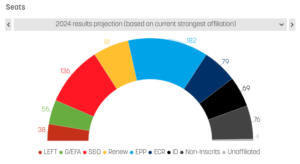While the sun still has not found its way through the Brussels clouds, EU election fever is reaching its peak in the European capital. In the week of the EU elections, it is high time to have a look at what the polls predict and what these prospective results would mean for startups. Consider this an EU elections weather forecast to see if we can spot some sun rays in the expected new political reality that will follow the election results.
What could the new composition of the European Parliament look like after the elections?
According to the latest polls, a rightwing shift in the European Parliament is predicted. While the two largest political groups in the European Parliament, the Christian Conservative centre-right EPP and the centre-left Socialists & Democrats (S&D) are expected to remain stable and retain their positions as the largest groups in the Parliament, the big winners of the upcoming EU elections are expected to be the rightwing conservative Eurocritical European Conservatives and Reformists group (ECR) and the rightwing populist Eurosceptic Identity and Democracy group (ID). On the other hand, the Liberals (Renew), who are currently in a coalition with the EPP and S&D, as well as the Greens are expected to suffer considerable losses.
To illustrate the imminent right wing shift, the polls currently predict populist right wing eurosceptic parties to win in the upcoming EU elections in nine EU member states, for instance in the Netherlands, where the populist party is polling to gain over 25% of the Dutch seats, France and Italy. In another nine countries, such as Germany and Poland, populist parties might come second.
Impact of the results on the EU institutions
Of course, the EU election results directly impact the composition of the European Parliament. Currently, EPP, S&D and Renew form a coalition holding a stable majority of 420 out of 705 seats (Figure 1). After the upcoming elections, the number of seats in the European Parliament will increase to 720 as a result of the redistribution of seats being a consequence of Brexit. As the EPP and S&D are predicted to remain stable, they are likely to be in a new coalition after the elections. Renew, however, is set to considerably lose seats. Despite this, the current coalition of EPP, S&D and Renew is most likely to be continued. Mostly because EPP, S&D and Renew have pledged not to work together in a coalition with populist eurosceptic groups. The most significant challenge will be, in this case, that the coalition will hold a substantially smaller majority. Therefore, in cases where voting cohesion within the three coalition groups will be lacking, they might have to look for other partners to find majorities.


Figure 1: Comparison of current EP composition versus the projected EU election results
Source: Euractiv
The election results will also have an impact on the European Commission. First, the new College of Commissioners needs to be appointed. Based on the election results, the largest group in the European Parliament gets to put forward its candidate. The most likely case, thus, will be that the EPP can propose their candidate, Ursula von der Leyen, for a second term at the helm of the European Commission. Yet, as the Member States, in the European Council, will be in charge of the appointment, a reappointment of Von Der Leyen is not set in stone, even when the EPP remains the largest group.
Apart from the European Commission presidency, the election results will impact the direction of the policy direction of the European Union, even though the European Parliament, the institution we directly vote for, does not have agenda-setting powers. The European Commission, together with the European Council (the heads of state and government of the member states) set the policy agenda. Yet, the Commission will immediately after the elections start gathering input and feedback from the new European Parliament. This way, the Commission tests the waters and discovers for which policy directions and proposals they will be able to find majorities in the European Parliament. The Parliament, thus, indirectly helps shape the policy agenda and, of course, at a later stage votes on every proposal the Commission puts forward. We can conclude that the EU elections not only determine the new composition of the European Parliament, but also impacts the other EU institutions and the policy direction for the next 5 years. In short, there is a lot at stake.
What does all of this mean for startups?
For startups, there are a number of key takeaways. First of all, it is important to realise that despite the expected rightwing shift, the current pro-EU coalition of Christian Democrats (EPP), Socialists and Democrats (S&D) and Liberals (Renew) is likely to be continued, albeit with a slimmer majority. On the other hand, the policy direction of the coming 5 years is likely to change. Expect more emphasis on the EU’s open strategic autonomy, (economic) security and defence, and reindustrialisation. In this context, the EPP is likely to propose a new Commissioner post for Defence, which is envisioned to have dual-use technology (AI, Quantum etc. etc.) in its portfolio. This to be created Defence Commissioner post, therefore, is one to keep an eye out on for startups.
That’s it for now. We will be back with an EU election results update soon after the elections. In the meantime, we wish you happy voting!

